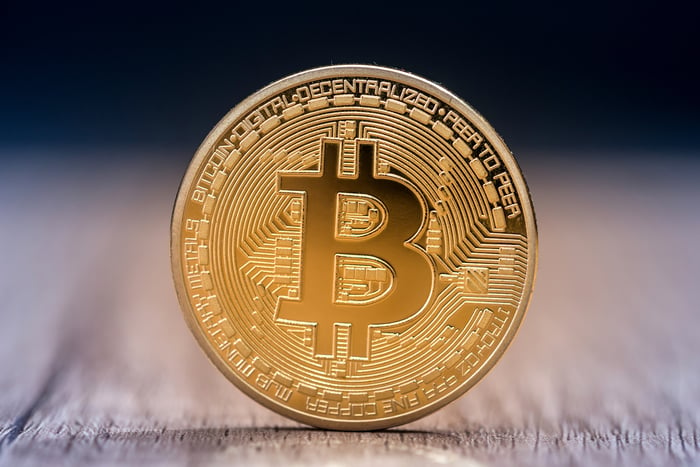Despite its recent correction, the cryptocurrency market has been nothing short of impressive for investors who've had the wherewithal, and guts, to invest. Last year alone, the combined value of all cryptocurrencies jumped from $17.7 billion to $613 billion, representing a gain of 3,300%. Even following the recent swoon, virtual currency market caps are up well over 2,000% since the beginning of 2017. Comparatively, the gains in the stock market look like a flat line.
Since coming into being nearly a decade ago, bitcoin has led the charge for cryptocurrencies. It's currently the world's most valuable digital currency by market cap, and the one most likely to be accepted by merchants worldwide.

Image source: Getty Images.
It also happens to be responsible for bringing blockchain technology into the spotlight. For those unfamiliar with blockchain, it's the digital, distributed, and decentralized ledger that underpins cryptocurrencies and is responsible for recording all transactions without the need for a financial intermediary. It's believed that blockchain could be the answer to expediting transaction settlement times, especially in cross-border payments, as well as lowering transaction fees.
Is bitcoin a failure?
For all that bitcoin has done for the cryptocurrency community, it may go down as a gigantic failure when all is said and done.
As reported by Bloomberg, two University of Pittsburgh researchers attempted to determine bitcoin's value and suggested it "has no value by traditional measures," and may never stabilize. "The cryptocurrencies may simply be a mechanism for a transfer of wealth from the late-comers to the early entrants and nimble traders," said the authors, Carey Caginalp and Gunduz Caginalp. By this definition, cryptocurrencies like bitcoin are nothing more than a pump-and-dump scheme with no true backing.
While there have been plenty of doom and gloom forecasts for bitcoin, two of which include JPMorgan Chase CEO Jamie Dimon calling it a fraud, and Berkshire Hathaway CEO Warren Buffett equating cryptocurrencies as nothing more than putting a dollar value on a check, the data is really beginning to stack against bitcoin succeeding over the long run.

Image source: Getty Images.
Evidence is growing that bitcoin could be a colossal bust
First of all, look at bitcoin's blockchain. According to a recently conducted analysis of transaction speed per second by HowMuch.net, bitcoin maxes out at just seven transactions per second. By comparison, Ethereum was nearly three times higher, and Ripple, which emerged from bitcoin's shadow late last year, can process up to 1,500 transactions per second. Visa, the leading global payment processor, can handle up to 24,000 transactions per second on its current network. Bitcoin simply doesn't stand a chance against those figures.
Transaction speed aside, other transaction-based metrics for bitcoin look downright ugly. In terms of the time it takes to complete a transaction, the average bitcoin transaction settles over an hour after it was initiated. Though still faster than some cross-border transactions, it's far slower than what Ripple, Stellar, and many other cryptocurrency-based or enterprise-developed blockchains have promised. Not to mention, the average fee for a bitcoin transaction now sits around $28, which is essentially the same cost as a bank wire transfer.
Beyond just picking on bitcoin's blockchain and its inability to scale its network with any profound success, it's also becoming less likely that bitcoin can meaningfully sway consumers away from using cash or credit to pay for goods and services. Of the more than 16.8 million bitcoin tokens in circulation today, approximately 40% are believed to be controlled by roughly 1,000 long-term holders and traders. Those holding bitcoin aren't using the coins for goods and services exchanges, while those acting as traders are exerting untold influence over the price of bitcoin, making it far too volatile for larger merchants to consider accepting as a method of payment.

Image source: Getty Images.
Recently, payment processor Stripe, which was virtually the first major company to go gung-ho on bitcoin in 2014, announced that it'd be dropping bitcoin as a payment method by April 2018. Noting its slow processing speeds and high transaction fees, Stripe views bitcoin as more of an asset to hold than a medium of exchange.
Lastly, keep in mind that bitcoin tokens have been stolen since inception, and may never be recovered. Though more than 16.8 million bitcoin have been mined to date, there's nowhere near that amount for consumers to use as a means to buy goods and services.
This isn't to say that the cryptocurrency movement will necessarily fade away, so much as to point out that bitcoin is unlikely to keep its leadership role over the long run with so much data stacked against it.

